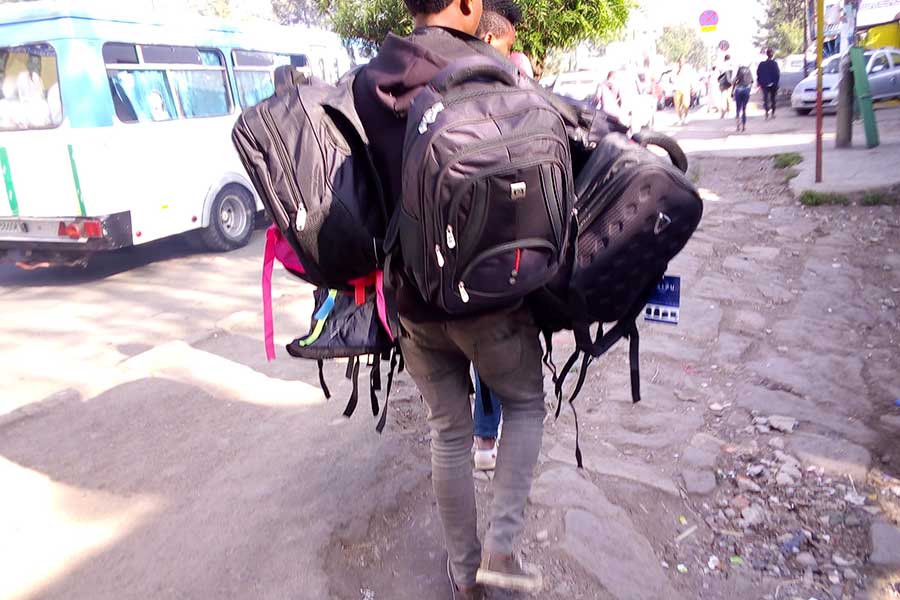
Commentaries | Sep 04,2021
Mar 6 , 2021
By Asegid Getachew
It is possible to evaluate the potential severity of exposure and determining the best mechanism to minimise impacts. A most pertinent example at the moment is the Novel Coronavirus (COVID-19) pandemic, for which many governments have been shown to be unprepared, writes Asegid Getachew (asewoldeam@gmail.com), assistant professor and research scholar at Andhra University.
Humanity has, from time immemorial, been grappling with pandemics, natural catastrophes and human-made (intentional or not) disasters. Such incidents have been responsible for the death and injury of millions, the destruction of property and, at times, the demise of civilisations.
Such events occur because we lack the full foresight about what unfolds in the future. Every day, month or year is filled with a surprise that deviates in the worst way from what we usually expect to happen.
Disaster may be impossible to avoid. However, the severity of the impact and its frequency could be managed if we have a proactive risk management system capable of identifying potential exposure based on previous experience with similar incidents. Disasters, such as pandemics, earthquake, cyclones, floods, hurricanes or forest fires, can, for instance, be managed by using the past as a baseline to develop models that portray the possibility of repeated exposures.
Doing this will enable humanity to evaluate the potential severity of exposure and determine the best mechanism to minimise the impacts. A most pertinent example at the moment is the Novel Coronavirus (COVID-19) pandemic. An epidemic of this size is a rare phenomenon. However, when they strike, the severity of devastation they cause is beyond imagination.
As humanity is fighting to fend off further devastation from this pandemic, some points are worth considering. Written on the face of history, we find a vivid account of pandemics and plagues that have come and gone. The most well known are the Black Death of the 14th century and the Spanish Flu of the early 1900s. Together, they have claimed hundreds of millions of people.
Why did so many people die? What went wrong? What success stories were there to learn from? How can we use whatever we have learned from past incidents in our current fight with the pandemic?
“Studying past outbreaks can help scientists better estimate the trajectory of COVID-19 and identify the best measures to slow its spread,” an article published in Scientific American, headlined “Lessons from Past Outbreaks Could Help Fight the Coronavirus Pandemic,” says.
It goes on to state that “the 1918 influenza pandemic and 2002–2003 SARS outbreak suggest social distancing measures, communication and international cooperation are the most effective methods to slow COVID-19,” in its excerpt.
For decision-makers around the world, there has been sufficient scientific evidence that wild animals are hosts to millions of potentially deadly viruses. In fact, scientists working on infectious and contagious diseases have warned for decades of a potential influenza outbreak from a strain of a virus that mutates from bats.
“We shouldn’t be surprised by the continuing emergence of new diseases—some with pandemic potential—if humanity continues with its wholesale destruction of nature,” as put by an opinion piece published in National Geographicheadlined “To prevent pandemics, stop disrespecting nature.”
It raises the potential of biodiversity, now in danger by unabated industrialisation and urbanisation worldwide, to help us address challenges thrown at us by the misuse of natural resources.
What are governments, civil societies, organisations and individuals doing so that this will not happen?
As the world is battling with the pandemic, some countries like China, Taiwan, South Korea and New Zealand have stood out in their effectiveness. They have coordinated efforts to flatten their curves early before any severe ramifications through effective utilisation of contact tracing, testing, hospitalisation and vaccine administration.
What have other countries learned from such best practices?
The world needs a system that is capable of “detecting and responding” to risk exposures proactively, as Bill Gates argued in his new book, “How to Avoid a Climate Disaster”. The billionaire was one of the few to have sounded the alarm against a pandemic just like the one we see now.
Combining past experience and heeding the scientific community's advice, countries can pull off an effective risk management strategy that can minimise the devastating consequences of disastrous events.
The same goes for Ethiopia. It has been documented in the history of the impacts of the Spanish Flu in the country in the late 1910s. It is even in memoriam in the tradition of Hidar Sitaten, a day event when rubbish is burned. The COVID-19 pandemic is another opportunity to learn and prepare for what the future may bring.
PUBLISHED ON
Mar 06,2021 [ VOL
21 , NO
1088]


Commentaries | Sep 04,2021

Commentaries | Nov 21,2020

In-Picture | Oct 26,2019

Viewpoints | Jul 07,2024

Radar | Nov 23,2019

Featured | Oct 03,2020

Radar | Nov 24,2024

Fortune News | Mar 13,2020

Verbatim | Jul 07,2024

Fineline | Apr 06,2019

Photo Gallery | 178247 Views | May 06,2019

Photo Gallery | 168454 Views | Apr 26,2019

Photo Gallery | 159230 Views | Oct 06,2021

My Opinion | 137057 Views | Aug 14,2021
Commentaries | Oct 25,2025

Dec 22 , 2024 . By TIZITA SHEWAFERAW
Charged with transforming colossal state-owned enterprises into modern and competitiv...

Aug 18 , 2024 . By AKSAH ITALO
Although predictable Yonas Zerihun's job in the ride-hailing service is not immune to...

Jul 28 , 2024 . By TIZITA SHEWAFERAW
Unhabitual, perhaps too many, Samuel Gebreyohannes, 38, used to occasionally enjoy a couple of beers at breakfast. However, he recently swit...

Jul 13 , 2024 . By AKSAH ITALO
Investors who rely on tractors, trucks, and field vehicles for commuting, transporting commodities, and f...

Oct 25 , 2025
The regulatory machinery is on overdrive. In only two years, no fewer than 35 new pro...

Oct 18 , 2025
The political establishment, notably the ruling party and its top brass, has become p...

Oct 11 , 2025
Ladislas Farago, a roving Associated Press (AP) correspondent, arrived in Ethiopia in...

Oct 4 , 2025
Eyob Tekalegn (PhD) had been in the Governor's chair for only weeks when, on Septembe...

Oct 25 , 2025 . By YITBAREK GETACHEW
Officials of the Addis Abeba's Education Bureau have embarked on an ambitious experim...

Oct 26 , 2025 . By YITBAREK GETACHEW
The federal government is making a landmark shift in its investment incentive regime...

Oct 29 , 2025 . By NAHOM AYELE
The National Bank of Ethiopia (NBE) is preparing to issue a directive that will funda...

Oct 26 , 2025 . By SURAFEL MULUGETA
A community of booksellers shadowing the Ethiopian National Theatre has been jolted b...